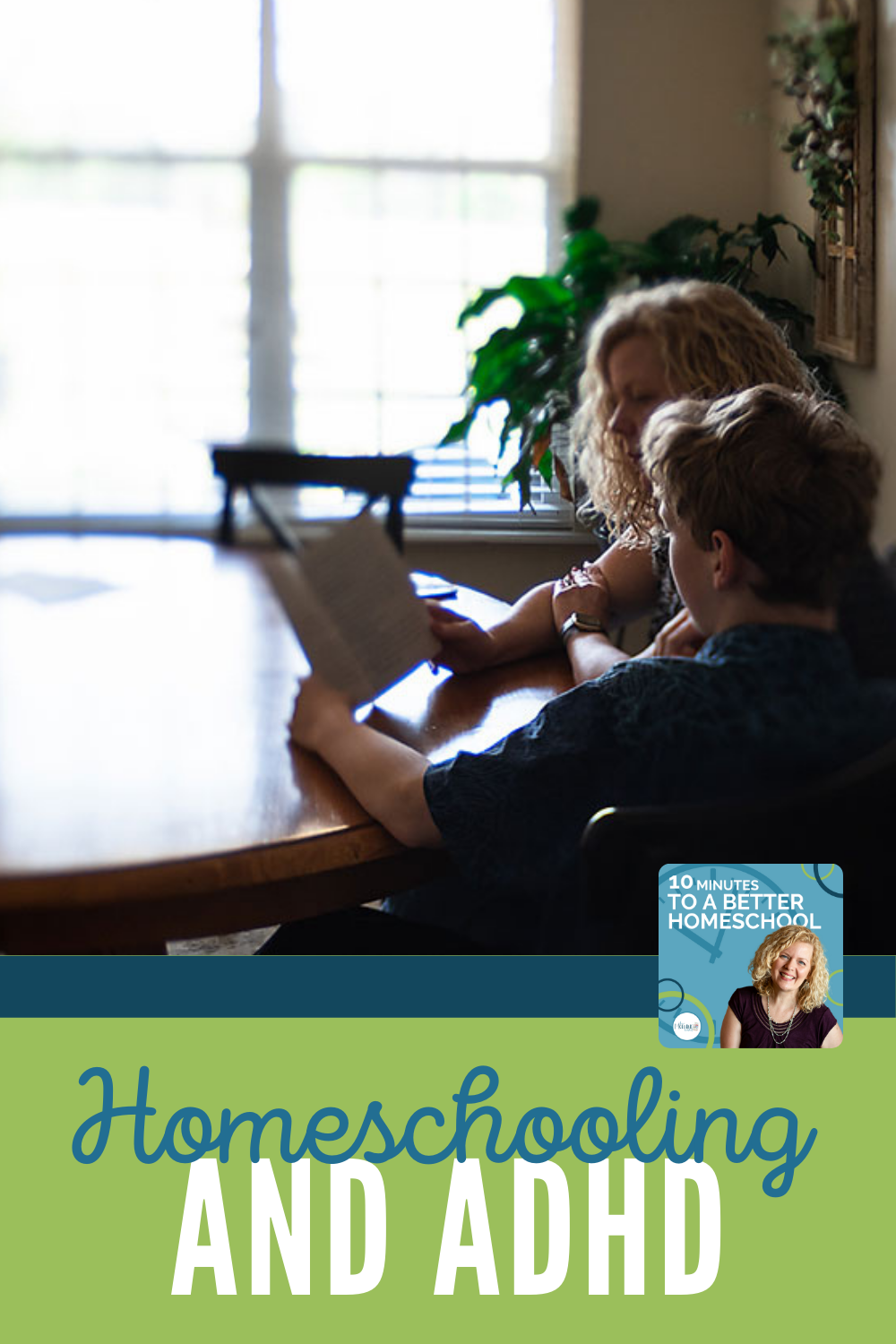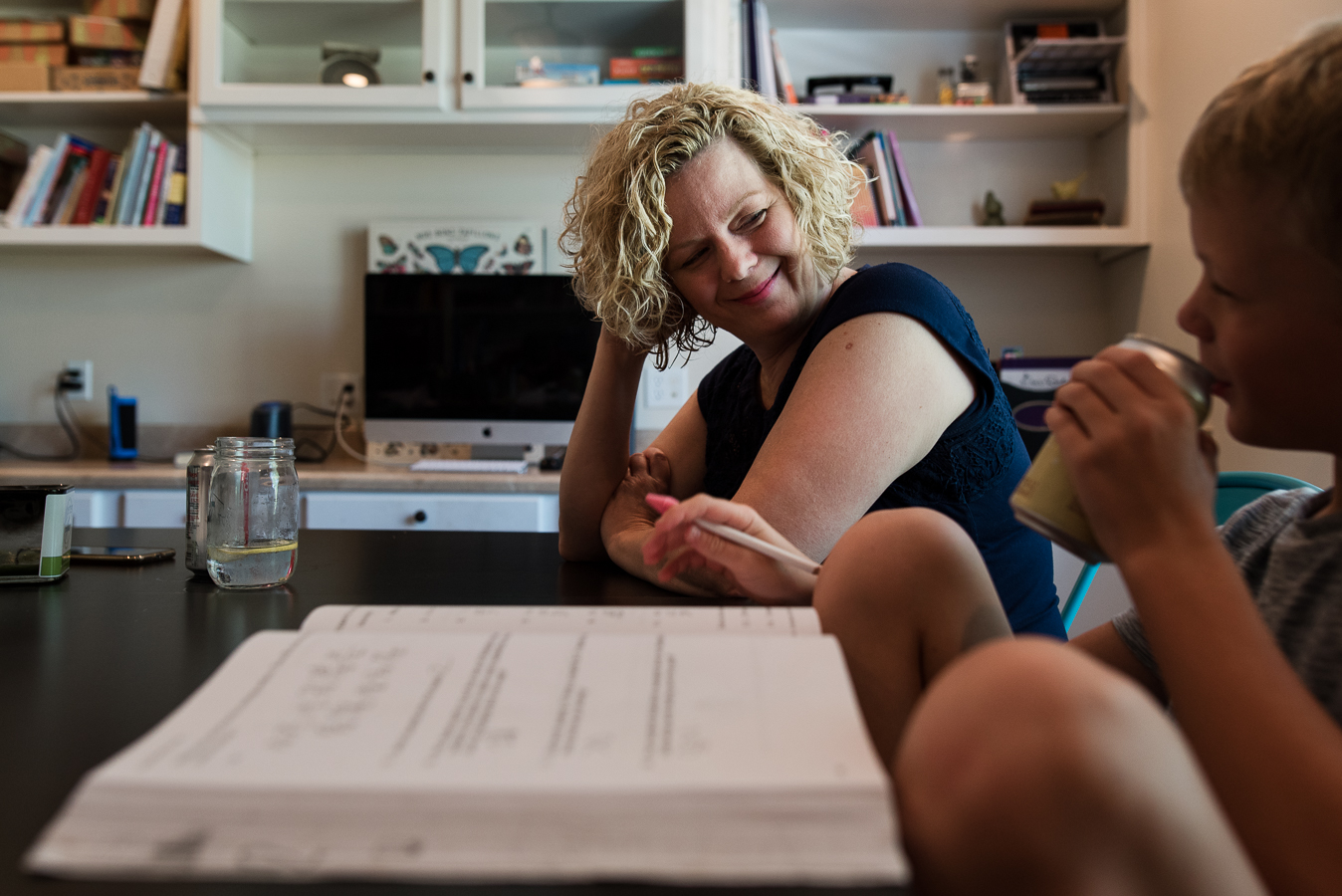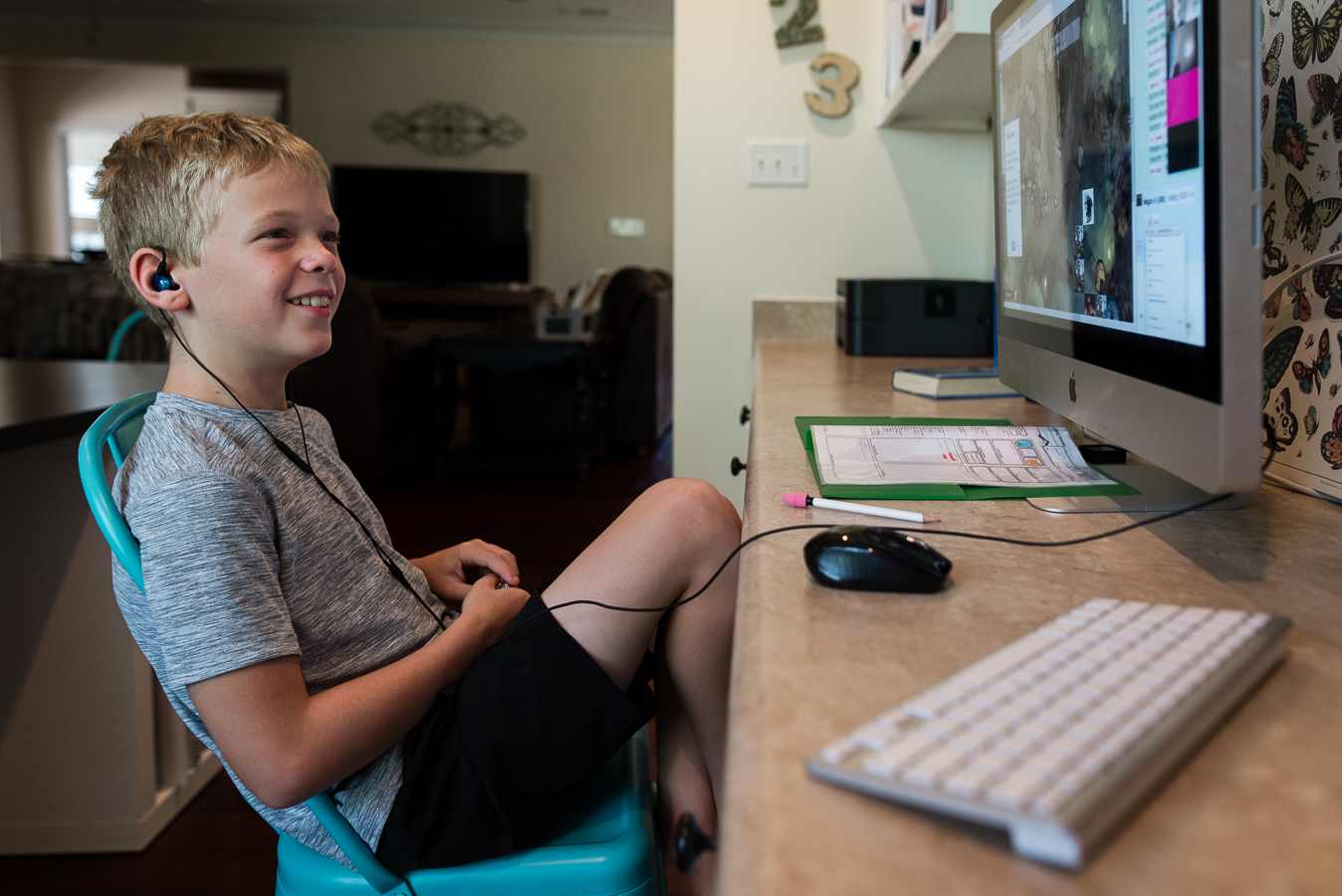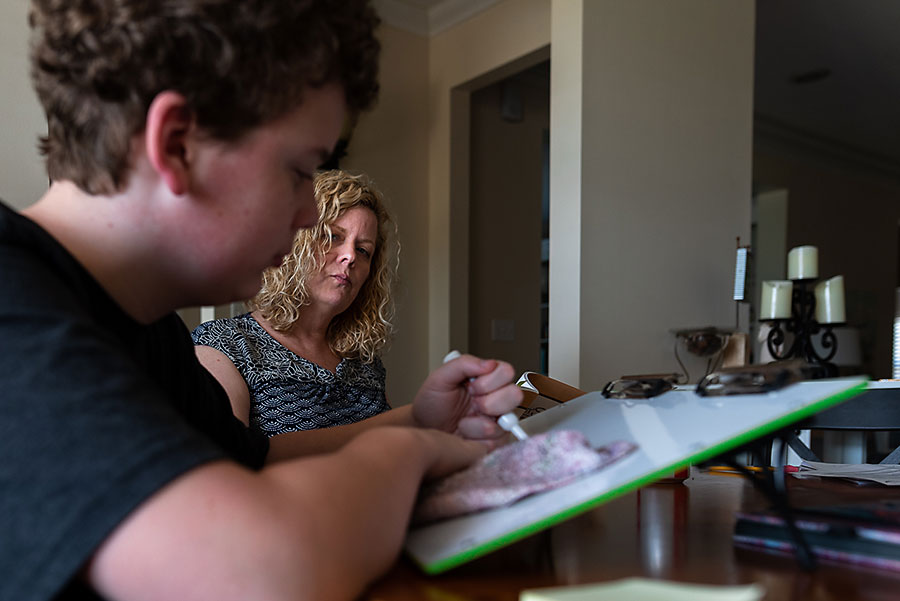
Do you suspect that your child has ADHD? Have you wondered what that means for your homeschool journey? Can you even appropriately homeschool a child with ADHD? Colleen Kessler, a former teacher and expert on gifted and twice-exceptional kids (plus a homeschool mom to more than one with ADHD) joins me today to answer these questions and more!
How Do I Know If My Homeschooled Child Has ADHD?
Your child won’t sit still and while they seem really interested in some things, you just can’t get them interested in school. Could there be a problem?
While these may sound like classic signs and symptoms of ADHD, how do you really know if your child has ADHD?
ADHD, attention deficit hyperactivity disorder, is a neurodiversity. It’s a brain wiring that gives kiddos (in laymen’s terms) a propensity to be wiggly, distractible, and to seem like they’re lacking in motivation. Children with ADHD may also hyper focus on things, which can be confusing. At times, they seem to be bouncing all over the place but then the brain can latch on to things and hyper focus.
Most of the time it’s incredibly energetic or staring off into space. There’s inattentive and there’s hyperactivity. We tend to think more about hyperactivity when we talk about ADHD, but both elements are a part of it.
What makes this difficult is that this describes most six year-olds. This is one of the reasons misdiagnoses occur.
It’s also one of the reasons a typical school setting can be very difficult for young children and why homeschooling can be a really good option.
The difference between a child with ADHD and a neurotypical child is that ADHD affects all areas of a child’s life in a negative way. It keeps them from doing things or being able to do things that most kids can do most age peers can do. You adjust based on on how old they are.
For example, a six year old kid is going to be wiggly, especially when they are not interested, overtired or hyped up on sugar. There’s a reason. The difference is that a six year old kid with ADHD is going to be distractible or hyperactive all the time. Their symptoms present in all situations and all settings. No one thing is going to be able to stop it for long.
Do I Need An ADHD Diagnosis For My Homeschooled Child?
What are the most important things that moms need to know if they are concerned their child has ADHD?
Some parents are pro label and some are totally against label. Some want medications, some want behavioral modifications, and some don’t want anything at all. It’s going to depend, first and foremost, on you as an individual.
What you are comfortable with sends you down the path of seeking a formal diagnosis or not. Either way, you can take steps to help your child with or without a diagnosis.
Colleen shares her experience with ADHD diagnoses for her children.
“One of my kids was diagnosed with ADHD way back when we were still traditionally schooling. We were trying to keep him in school, as homeschooling wasn’t quite on our radar yet. We tried all sorts of things. Some were helpful, and some were a complete disaster.
We have another child who we believe also has ADHD that we don’t have a diagnosis for and probably will never seek one for. We’ve learned over the years how to help provide support for a child with ADHD and we have no intention of enrolling that child in a school or other type of situation. It just wouldn’t be appropriate for them, with or without a diagnosis.”
The first question to ask as a parent is, “What is it affecting?” Is it affecting how you can function as a family? Is it affecting the school setting?
From there, determine if you want, or need an official diagnosis and what you’re going to do as a result of that. Even if you don’t need a diagnosis, what kinds of things can you put into place right now to help your child.
You will also want to educate yourself about ADHD.
One of our favorite books for parents homeschooling children with ADHD is The Gift Of ADHD. The author takes it from the perspective that this kind of hyper-focused brain and hyperactive brain is a gift and something that’s beautiful and worthy of being harnessed for good. The book is all about perspective and mindset shifts.
Listen to the Episode:
Can You Successfully Homeschool A Child With ADHD?
It’s totally possible to homeschool a child with ADHD. It’s not only possible, but for a lot of children, it’s actually the best possible educational choice.
You will be working differently. You’re going to need to take some time to understand it and likely change your own thinking a bit to be able to best meet the needs of your child.
This child is not going to go easily into that box. It is OK to change the box.
Homeschooling is in many ways the ideal situation for a kiddo with ADHD, whether diagnosed or not.
The Benefits Of Homeschooling A Child With ADHD
Homeschooling is often an advantage for a child who has ADHD.
We have an opportunity as homeschoolers to keep things interesting and moving at a pace that suits the child’s brain wiring and educational needs.
Instead of reading on the couch, read at the table, read under the table, and bring out snacks for reading time. An ADHD brain seeks novelty. Any kind of little tweak you can do that makes it feel different or novel will help your child engage in the learning.
Colleen shares, “One of the things we did that worked for my oldest when he was young is I would take the math paper out of the math workbook and I would cut it into pieces. I would tape it around the house and say, there’s seven pieces today. Go find them. Oh, today there’s only four. Go find them. It was different.”
Shawna Wingert, from Different By Design Learning talks about taking her ADHD kid out with a Nerf gun and shooting math facts as he solves them. She also allowed him to do a lot of memorization and learning while jumping on the trampoline.
If there’s one thing that changes it up the learning during the day, it can help the brain refocus and engage. Homeschooling let’s us do this all the time.
How Do I Know My Homeschooled Child Will Be Prepared For Adulthood?
As parents, we want to make sure that we are preparing them for a world that may not know much about ADHD or may not be willing to make things novel for them as they enter into college or adulthood.
The reality is that differently wired kids are differently wired. They’re going to have a differently wired life. Our job is to help them be the best “thems” that they can be. Sometimes, it means they’re not going to do the typical thing, and that’s OK. We can help prepare them for life by helping them see what’s amazing about the way their brain works – what’s amazing about who they are and then giving them the tools to be successful.
We can expose them to different things that can capitalize on their unique differences. For example, Colleen’s son spent a lot of time doing video in their homeschool because he was interested in it. Watching videos instead of reading textbooks, learning different coping mechanisms, including color coding calendars and similar accommodations – their homeschool looked different, but it helped him understand himself and how he best works in the world.
If he needs to approach things differently, he doesn’t feel badly about the fact that his brain thinks differently. We can prepare our kids for the future by getting to know them, helping them know themselves, and then giving them the coping mechanisms along the way that they need to be successful.
Watch on YouTube:
One little thing I read a long time ago was an account by somebody who has ADHD and was super successful in college. One of the things he said he did was record all of his lectures. He would then play them at five times the speed later at night because his brain worked so fast. The lectures seemed endless and boring to him, but he could get the material if it was going super fast, because his brain was processing in that way.
He learned a coping mechanism. He wasn’t actively engaged necessarily in the lessons, but he also wasn’t sloughing off. He found a way to help his brain process it and he did amazing things.
This is to goal: to help them understand and appreciate who they are first. Then find the coping mechanisms that are right for them.
This is very individualized. No one ADHD solution is going to work for every single ADHD child. You have to be a student of your child.
Do this, and you can absolutely successfully homeschool your child with ADHD.
(Coleen Kessler is an author, speaker, and education consultant with a master’s degree in gifted education. She is a passionate advocate for the needs of differently wired kids. And as a homeschool mom of four gifted twice exceptional kids of her own, one of whom has now graduated, she is the founder of the popular podcast and website Raising Lifelong Learners and The Learners Lab, a member community for neurodiverse families and she’s also a really good friend of mine.)
- Homeschooling Boys with Durenda Wilson - April 12, 2024
- What About Lab Sciences? with Dr. Moon - March 29, 2024
- Can I Teach Everything My High Schooler Needs to Know? - March 15, 2024
Leave a Rating or Review
Doing so helps me get the word out about the podcast. iTunes bases their search results on positive ratings, so it really is a blessing — and it’s easy!
- Click on this link to go to the podcast main page.
- Click on Listen on Apple Podcasts under the podcast name.
- Once your iTunes has launched and you are on the podcast page, click on Ratings and Review under the podcast name. There you can leave either or both!




